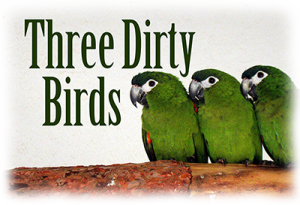Three Dirty Birds Talk Exposition
The Dirty Birds are chirping about James Scott Bell and Exposition.
Kate: I thought it was ironic that the chapter on exposition was one of the shortest in the book. :)
Zoe: It really was very short. Does he not know we need to fill up a discussion here?
Ana: It���s like he doesn���t even care.
Kate:I think he just applied his own rules about exposition to it.
Zoe: The chapter really needed to be just four bullet points long���they���re perfect. It���s info the reader needs, but it will slow your story down if it���s not handled well. Cut anything that isn���t necessary. Drop exposition in a little at a time. And hide it within dialogue.
Kate: His first example of using it in dialogue made me laugh. Mostly because it was a lovely example of the ���As you know, Bob������ trick.
Zoe: I liked how his third example shows you how to add some conflict into the exposition dialogue to make it more interesting/energetic.
Ana: I think the conflict into the exposition dialogue thing is something the Story Trumps Structure book mentioned too. I���ve since successfully used it in one of my WIPs. Well��� we���ll see how successfully if I ever get around to actually publishing that one.
Kate: I think that���s something that newer writers often miss. You can tell who���s at certain levels of professionalism in their writing by how they handle stuff like that. But it���s nice to be reading along through a writer���s work and suddenly see them pushing the conflict through the dialogue and getting the info we need in there as well. Everything in a well-thought out book should be doing something, and the important bits need to do two or three things.
Zoe: I like the ���Act first, explain later��� rule, though, as with any rule, I���ve seen it sorely misused���book openings that drop you into the middle of action that makes no sense and has no emotional pull…followed by chapter two of tell, tell, tell.
Ana: I always have to watch not to fall into that trap, because when writing I���m very much an ���act first, explain later��� kind of person. (I���ve actually just had a discussion with my editor about the first chapters of my latest story because I was being paranoid about whether my character���s actions made sense before the ���reveal��� )
Kate: I like that, though. As long as there���s enough in there to keep you reading. I���m reading ���The Girl in the Road��� right now, and it starts off with a bang, and she���s running away, but I still don���t know what the conflict is. The author explains a little bit more on every page, though, so I haven���t gotten frustrated and thrown it aside.
Zoe: Yes, when it���s done well, it works really well (though, not so much the nothing-but-tell follow-on chapter, but when the opening is done well, the author usually isn���t the type to do that). More often, it seems like it���s not done all that well. (Though I can rattle off books that do do it well, I���ve forgotten the names of every book that didn���t���I didn���t bother buying past the Look Inside on those.)
Kate: I wonder if we���ll ever find a book that provides some guidelines for deciding that something isn���t necessary information. All the books seem to say that you have to pick and choose, but don���t give any idea how. And I think a lot of the people that overdo the exposition aren���t doing it from ���whatever���, but just can���t figure out which information is useful, which is necessary, which is color, and which is too much. All the first three of those are necessary, but if you don���t know where to stop…
Zoe: I���ve seen some guidelines that have said to leave out what the reader would already know���readers know what bathrooms contain, so if there���s nothing specifically unique and/or important to the story in a bathroom your character walks into, don���t describe the bathroom. But there can be a confidence issue when trying to figure out what readers might or might not know, especially in spec fic, historicals, and exotic locales.
Ana: Damnit, I totally missed my chance to describe high tech Japanese toilets in my last story.
Kate: There���s always edits, Ana.
Zoe:I love high tech Japanese toilets. And I���m still amused by my time in Okinawa, where in a single day I could wind up using a toilet with a heater and remote control and more buttons than I could ever know what to do with…and a hole in the ground.
Kate: I liked his idea in the exercise, using the Wikipedia article. Especially, I liked that he said to put it away for a couple of days and then come back and edit it.
Zoe: Yes, that looked like a very useful exercise you could use any time you have info to weave in. Write down the facts, then use the facts to write a scene that���s not all fact-y sounding.
Kate: For some strange reason, I���m more likely to try the exercises he gives than any of the ones in the other books. I���m not sure why they resonate with me more. But they do.
Zoe: I haven���t done anyone���s exercises, but I read them and think, ���That���s a nice exercise.���
Ana: I���ve actually done one of the exercises in this book, which is a first for me. It���s one mentioned in the ���themes��� chapter, which I think comes up next.
Filed under: Three Dirty Birds Talk, writing Tagged: James Scott Bell, revision, self-editing





